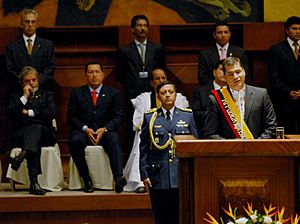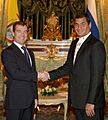Rafael Correa facts for kids
Quick facts for kids
Rafael Correa
|
|
|---|---|
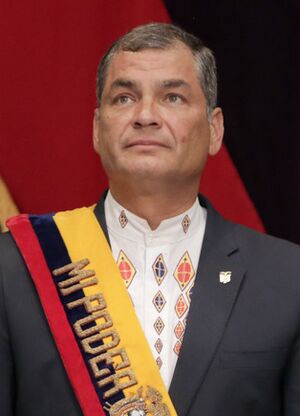
Correa in 2017
|
|
| 45th President of Ecuador | |
| In office 15 January 2007 – 24 May 2017 |
|
| Vice President |
|
| Preceded by | Alfredo Palacio |
| Succeeded by | Lenín Moreno |
| President of the PAIS Alliance | |
| In office 2 April 2006 – 1 May 2017 |
|
| Preceded by | Party established |
| Succeeded by | Lenín Moreno |
| Minister of Economy and Finance | |
| In office 20 April 2005 – 9 August 2005 |
|
| President | Alfredo Palacio |
| Preceded by | Mauricio Yépez |
| Succeeded by | Magdalena Barreiro |
| Personal details | |
| Born |
Rafael Vicente Correa Delgado
6 April 1963 Guayaquil, Ecuador |
| Political party |
|
| Other political affiliations |
Acuerdo Nacional (since 2018) |
| Spouse |
Anne Malherbe Gosselin
(m. 1992) |
| Children | 3 |
| Alma mater |
|
| Signature |  |
Rafael Vicente Correa Delgado (born 6 April 1963) is an Ecuadorian politician and economist. He served as the 45th president of Ecuador from 2007 to 2017. Correa was the leader of the PAIS Alliance political party. His government focused on left-wing policies and a form of government called democratic socialism. This means the government plays a larger role in the economy to help its citizens.
Correa was born in Guayaquil, Ecuador, to a middle-class family. He studied economics at universities in Ecuador, Belgium, and the United States. He earned his PhD from the University of Illinois. In 2005, he became Ecuador's Minister of the Economy. He successfully pushed for more government spending on health and education.
In 2006, Correa won the presidential election. He promised to challenge the country's powerful political groups. As president, he moved Ecuador away from neoliberalism, an economic model with less government control. He reduced the influence of the World Bank and the International Monetary Fund. He also introduced a new constitution for the country. He was reelected in 2009 and again in 2013.
During his time as president, poverty in Ecuador dropped from 36.7% to 22.5%. The minimum wage was raised, and the country's standard of living improved. After his presidency ended in 2017, he moved to Belgium with his family.
Contents
Early Life and Education
Growing Up in Guayaquil
Rafael Correa grew up in the coastal city of Guayaquil. He has a brother, Fabricio, and two sisters, Pierina and Bernardita. He described his family as being part of the "lower middle class."
Correa was involved in the Boy Scouts and was a good student. He received a scholarship to study at the Universidad Católica de Santiago de Guayaquil (UCSG). There, he earned a degree in economics in 1987. He was also a student leader and became president of the student federation.
University and Early Career
After graduating from UCSG, Correa worked for a year at a mission in a small town. He taught math and religion. There, he learned to speak Quechua, the language of many of Ecuador's indigenous people.
He later earned a scholarship to study at UCLouvain in Belgium. In Belgium, he met Anne Malherbe Gosselin, whom he later married. He received a Master of Arts degree in Economics in 1991. He continued his studies at the University of Illinois at Urbana-Champaign, earning a Master of Science and a PhD in economics.
When he returned to Ecuador, Correa taught economics at the University of San Francisco. He also worked as an advisor for the government.
Political Career
Minister of Finance
On 20 April 2005, Correa became the Minister of Economy and Finance. He was skeptical about a free trade agreement with the United States. He preferred to work more closely with other Latin American countries.
One of his most important decisions was to use money from oil sales for health and education. Before, this money was used to pay off the country's debt. After the World Bank stopped a loan, Correa resigned from his position. At the time, polls showed that 57% of Ecuadorians trusted him.
2006 Presidential Campaign
Correa decided to run for president in 2006. He called his campaign a "citizen's revolution" against the old political parties. He promised to create a new constitution to give more power to the people.
His political party was called the PAIS Alliance. He formed alliances with other leftist parties, like the Ecuadorian Socialist Party and the Communist Party of Ecuador.
Correa called for reforms in the oil industry. He wanted more of the money from oil to be spent on social programs for the poor. He also said he would work to reduce Ecuador's foreign debt. In the November 2006 election, he won with 57% of the vote.
Presidency (2007–2017)
Rafael Correa became president on 15 January 2007. In his first speech, he said his election was the end of neoliberalism in Ecuador. He promised to fight against discrimination and for social justice.
In his first months, Correa's government doubled the monthly payments to people in poverty. It also increased loans for housing and lowered electricity costs for low-income families.
First Term: 2007–2009
Correa's government focused on social programs and changing the economy. He wanted to build a system that focused on "Good Living" (Buen Vivir) instead of just economic growth.
Economic Policy
Correa took a strong stance against the International Monetary Fund (IMF) and the World Bank. He paid off Ecuador's debt to the IMF and said the country would no longer follow its advice.
He declared much of Ecuador's national debt to be illegitimate. He refused to pay over $3 billion in bonds. This move helped reduce the price of the bonds, and Ecuador later bought them back for a much lower price. This saved the country a lot of money.
Foreign Policy
Correa changed Ecuador's relationships with other countries. He strengthened ties with other left-wing governments in Latin America, like Venezuela and Bolivia.
His relationship with the United States became more distant. He refused to renew the lease for a U.S. military base in Manta. The base was closed in 2009. The new constitution also banned any foreign military bases in Ecuador.
In 2008, there was a diplomatic crisis with neighboring Colombia. The Colombian military launched an attack on a FARC guerrilla camp inside Ecuador's border. Correa called the attack a "massacre" and a violation of Ecuador's territory. He temporarily cut diplomatic ties with Colombia.
A New Constitution
In 2007, Ecuadorians voted to create a Constituent Assembly to write a new constitution. Correa's party won a majority of the seats in the assembly. The new constitution was approved by voters in a referendum in September 2008.
The new constitution gave more power to the president. It also included new environmental protections, giving rights to nature itself.
Second Term: 2009–2013
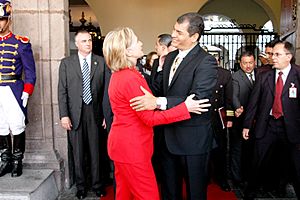
Correa was re-elected in April 2009 with 52% of the vote. He was the first president in 30 years to be re-elected. He promised to continue his "socialist revolution" and fight poverty.
Health and Education
The government greatly increased spending on health and education. The health budget grew from $561 million in 2006 to $1.774 billion in 2012. New hospitals were built, and doctors' salaries were increased.
A new Higher Education Law was passed in 2010. The law aimed to improve the quality of universities. The government also started a large scholarship program. It sent thousands of students to study at top universities around the world.
2010 Crisis
On 30 September 2010, some police officers went on strike to protest a new law. The protests became violent, and some called it an attempted coup d'état (an attempt to overthrow the government).
President Correa went to speak with the protesters but was taken hostage. He was held in a hospital for several hours before being rescued by the army. Leaders from across South America met and expressed their full support for Correa and Ecuador's democracy.
Third Term: 2013–2017
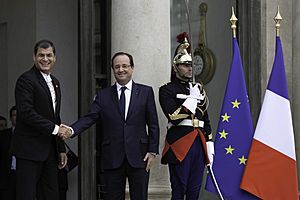
Correa won the 2013 election by a large margin. His party, Alianza PAIS, also won a majority in the National Assembly.
Social and Economic Progress
Between 2007 and 2014, poverty in Ecuador fell from 36.7% to 22.5%. Economic inequality also decreased. The government made major progress in helping people with disabilities. It increased spending on assistance programs from $2 million to $150 million per year.
The homicide rate also dropped significantly. It went from 18 per 100,000 people in 2011 to 5.8 in 2017. This made Ecuador one of the safest countries in the Americas. This was achieved through police reform and social programs.
Environmental Policies
Correa's government promoted environmental conservation. One famous project was the Yasuní-ITT Initiative. The plan was to leave a large oil reserve untouched in the Amazon rainforest. In exchange, Ecuador asked the international community for money.
The goal was to protect the rainforest and prevent carbon emissions. However, the plan did not receive enough international funding. In 2013, Correa allowed oil drilling in the area to continue.
Post-Presidency
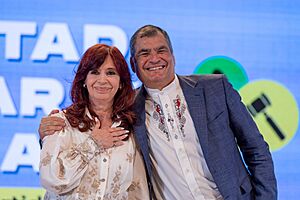
After his presidency ended in 2017, Correa moved to Belgium. He has remained active in politics. He often shares his opinions on Ecuador's government through social media and newspaper articles.
He has hosted a political talk show on the TV network RT Spanish since 2018. He also continued to support Julian Assange. When Ecuador withdrew Assange's asylum in 2019, Correa called the decision a betrayal.
Political Views
Correa calls himself a supporter of "socialism of the 21st century". This idea focuses on using government power to create social justice and reduce poverty. His government increased state control over the economy. It also invested heavily in social programs like health, education, and welfare.
He is also known as a populist leader. This means he appealed directly to ordinary people and challenged the country's powerful groups. He was socially conservative on some issues. For example, he stated his opposition to same-sex marriage.
Images for kids
-
Correa and Russian President Dmitry Medvedev in Moscow, 29 October 2009
-
Rafael Correa with Pope Francis, 6 July 2015
-
Correa and President of Argentina Mauricio Macri, 10 December 2015
See also
 In Spanish: Rafael Correa para niños
In Spanish: Rafael Correa para niños
 | Dorothy Vaughan |
 | Charles Henry Turner |
 | Hildrus Poindexter |
 | Henry Cecil McBay |


